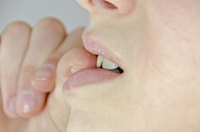
What do Cupid and gum disease have in common? Both get hearts pounding – but in very different ways! The mythical winged matchmaker is known to link lovers, while recent research shows a link between gum disease and heart disease. In fact, having gum disease roughly doubles the risk that a person will also suffer coronary artery disease. Gum disease can also make existing heart conditions worse.
Because of this, people at risk for heart problems should be especially careful to practice proper oral hygiene and seek treatment for gum disease. Likewise, people with heart conditions should pay extra attention to their oral health, because many heart medications can cause dry mouth, increased plaque or enlarged gum tissue – all of which may lead to gum infection.
Researchers are sure of cause and effect, but one theory is that bacteria in the mouth may migrate into the blood stream, where it can attach to fatty plaques and form clots. Another theory is that the inflammation caused by gum disease promotes the formation of plaque in the blood. What is known is that oral health and overall health go hand in hand. Talk to your dentist or periodontist about the best way to keep your gums – and your whole body – healthy for years to come.
